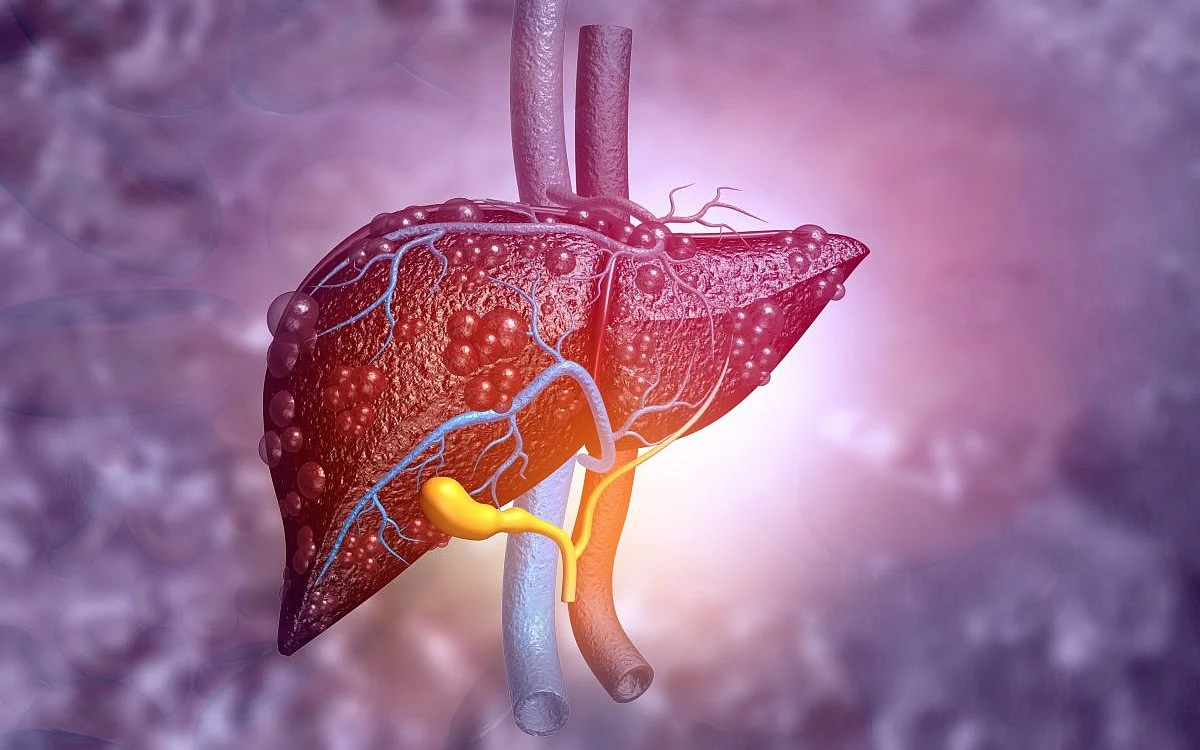Prevalence of Alcohol-Related Liver Fibrosis More Than Doubled Over Last 20 Years
By Elana Gotkine HealthDay Reporter
 via HealthDay
via HealthDayMONDAY, July 28, 2025 -- The prevalence of liver fibrosis has more than doubled over the last 20 years among heavy alcohol consumers, according to a research letter published online July 23 in Clinical Gastroenterology and Hepatology.
Kalpana Gopalkrishnan, from the Keck School of Medicine at the University of Southern California in Los Angeles, and colleagues used National Health and Nutrition Examination Survey data from 1999 to 2020 to examine whether the risk for advanced alcohol-associated liver disease has changed over time among those consuming an increased amount of alcohol. Increased alcohol consumption was defined as ≥20 g/day for women and ≥30 g/day for men in the previous 12 months. The primary outcome was a high Fibrosis-4 (FIB-4) score (>2.67 for adults aged 65 years and younger and >3.25 for those older than 65 years), which was used as a surrogate for liver fibrosis.
Overall, 2,474 of the 44,628 participants were increased alcohol consumers. The researchers found that among increased alcohol consumers, the prevalence of high FIB-4 increased over time, from 1.8 to 4.3 percent in 1999-2004 and 2013-2020, respectively. The corresponding prevalence increased from 0.8 to 1.4 percent among those without increased alcohol consumption. Mean age increased among increased alcohol consumers, and the proportion of women and individuals living in poverty was higher. Similar mean alcohol use was seen across eras. Among increased alcohol consumers, the prevalence of metabolic syndrome increased from 26.4 to 37.6 percent from 1999-2004 to 2013-2020; the corresponding prevalence increased from 32.0 to 40.2 percent among those without increased alcohol consumption.
"These findings -- the first comprehensive look at the demographics of heavy drinking and their relation to liver disease since the 1990s -- provide important new information about which population groups may need more intervention to curb alcohol use and may also explain the rise in liver disease over the years," lead author Brian P. Lee, M.D., also from the University of Southern California, said in a statement. "Our results show that the makeup of the American public with heavy alcohol consumption has changed compared to 20 years ago."
Abstract/Full Text (subscription or payment may be required)
Disclaimer: Statistical data in medical articles provide general trends and do not pertain to individuals. Individual factors can vary greatly. Always seek personalized medical advice for individual healthcare decisions.
Source: HealthDay
Posted : 2025-07-29 06:00
Read more

- Early Study Results from Johnson & Johnson Show Promising Antitumor Activity with Combination of Pasritamig and Docetaxel in Advanced Prostate Cancer
- Zepbound (tirzepatide), the Most Prescribed Weight Management Medication in 2025, Now Available in Multi-Dose KwikPen
- How the Brain Learns to Have Seizures During Sleep
- Deciphera Pharmaceuticals Announces U.S. Food and Drug Administration Acceptance for Filing of New Drug Application for Tirabrutinib in Patients with Relapsed or Refractory PCNSL
- Obstructive Sleep Apnea Tied to Nearly Doubled Risk for Flu, COVID-19 in Childhood
- Novo Nordisk Announces Significant Reduction in US List Price for Wegovy, Ozempic, and Rybelsus (semaglutide medicines), Building on Continued Efforts to Expand Access
Disclaimer
Every effort has been made to ensure that the information provided by Drugslib.com is accurate, up-to-date, and complete, but no guarantee is made to that effect. Drug information contained herein may be time sensitive. Drugslib.com information has been compiled for use by healthcare practitioners and consumers in the United States and therefore Drugslib.com does not warrant that uses outside of the United States are appropriate, unless specifically indicated otherwise. Drugslib.com's drug information does not endorse drugs, diagnose patients or recommend therapy. Drugslib.com's drug information is an informational resource designed to assist licensed healthcare practitioners in caring for their patients and/or to serve consumers viewing this service as a supplement to, and not a substitute for, the expertise, skill, knowledge and judgment of healthcare practitioners.
The absence of a warning for a given drug or drug combination in no way should be construed to indicate that the drug or drug combination is safe, effective or appropriate for any given patient. Drugslib.com does not assume any responsibility for any aspect of healthcare administered with the aid of information Drugslib.com provides. The information contained herein is not intended to cover all possible uses, directions, precautions, warnings, drug interactions, allergic reactions, or adverse effects. If you have questions about the drugs you are taking, check with your doctor, nurse or pharmacist.
Popular Keywords
- metformin obat apa
- alahan panjang
- glimepiride obat apa
- takikardia adalah
- erau ernie
- pradiabetes
- besar88
- atrofi adalah
- kutu anjing
- trakeostomi
- mayzent pi
- enbrel auto injector not working
- enbrel interactions
- lenvima life expectancy
- leqvio pi
- what is lenvima
- lenvima pi
- empagliflozin-linagliptin
- encourage foundation for enbrel
- qulipta drug interactions
